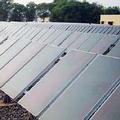 據5月29日發表的最新研究顯示,除非成功改善能源效益,否則中國、印度與巴西等國的經濟發展熱潮,將使其能源使用及溫室氣體排放在下一世代前成長兩倍以上,並將大大衝擊全球能源市場與氣候。上述研究結果是由多個機構合作所提出的,參與者包括世界銀行、聯合國環境規劃署研究機構(丹麥Risoe研究中心),及巴西、中國與印度的夥伴機構。
據5月29日發表的最新研究顯示,除非成功改善能源效益,否則中國、印度與巴西等國的經濟發展熱潮,將使其能源使用及溫室氣體排放在下一世代前成長兩倍以上,並將大大衝擊全球能源市場與氣候。上述研究結果是由多個機構合作所提出的,參與者包括世界銀行、聯合國環境規劃署研究機構(丹麥Risoe研究中心),及巴西、中國與印度的夥伴機構。
「改善既有建築和其他公共建設的能源效率,可減少中國、印度和巴西三國至少25%以上的能源消耗量,等於減少數百萬噸溫室效應氣體排放量,並節省數億美元的能源費用。」世銀能源專家暨「三國能源效率計劃」(3CEE)的領導人泰勒(Robert Taylor)如此表示。3CEE計劃啟動於2001年,其目的是利用放寬金融機構投資條件的方式,在中國、印度和巴西推動能源效能方案。
根據3CEE計劃的分析,若運用先進科技,那麼2030年能源使用成長的估計值,至少可下降一成;二氧化碳排放成長的估計值也可減少16%以上。而要釋放這些節能效果的潛力並不難,僅需採行成本效益高、創新的簡易方案,針對能源浪費的根源加以診斷然後消除即可。最重要的是,要能促成合作共識、提供支持以催化各方參與,並能喚起商業銀行的支持,使銀行願意放寬融資條件供各地類似計畫申請。
不過,推展的困難還是存在。世銀資深環境專家高文達拉傑魯(Chandra Govindarajalu)指出:「儘管已經把可見的利潤展現出來了,但企業通常想的是其他更直接的投資,借款用途也常優先排給其他投資機會。同時,商業銀行也寧可開發新產品線或做其他有形資產投資,因為相對來講,他們對這類為了節省成本而設計的融資專案較不熟悉。」
3CEE計劃中分析,儘管能源節大有可為,但目前要達成實質的投資尚面臨許多困難;企業內部仍存在諸多障礙,例如欠缺對新能源效能技術的認識和經驗,都是原因。泰勒說:「我們下一步要做的,就是在中國、巴西、印度以及各個發展中國家經濟體,不斷的開發這類小型計畫,透過上千上萬個計畫,將可達到巨大的能源節約效果。」
線上瀏覽3CEE計劃的分析報告,可前往以下網址:http://3countryee.org。
 The hot economies of China, India and Brazil will more than double their energy use and greenhouse gas emissions within a generation with major impacts on global energy markets and the global climate, unless energy efficiency efforts are successful, according to new research published Monday. The study is a joint initiative of the World Bank, the UN Environment Programme's Risoe Centre, based in Denmark, and partners in Brazil, China and India.
The hot economies of China, India and Brazil will more than double their energy use and greenhouse gas emissions within a generation with major impacts on global energy markets and the global climate, unless energy efficiency efforts are successful, according to new research published Monday. The study is a joint initiative of the World Bank, the UN Environment Programme's Risoe Centre, based in Denmark, and partners in Brazil, China and India.
"Improving energy efficiency for existing buildings and other infrastructure could cut current energy consumption by 25 percent or more in India, China and Brazil, amounting to millions of tons in reduced greenhouse gas emissions and hundreds of millions of dollars in energy savings," says Robert Taylor, a World Bank energy specialist and leader of the 3 Country Energy Efficiency Project (3CEE).
Initiated in 2001, the 3CEE Project has worked to promote energy efficiency projects in China, India, Brazil by easing typical investment requirements of financial institutions.
Advanced technologies could reduce their energy use growth projected through 2030 by at least 10 percent and reduce projected carbon dioxide (CO2) emission growth by 16 percent. Unlocking these potential savings requires simple, highly cost-effective renovation projects to identify and eliminate energy waste, the project analysts found.
The keys are fostering corporate awareness, supporting catalyst energy efficiency practitioners and enlightening commercial banks to ease access to local financing for such projects, they said.
"Despite the demonstrated benefits, though, companies often cite other, more immediate investment and borrowing priorities," says Chandra Govindarajalu, a senior World Bank environmental specialist. "Meanwhile, commercial banks in these countries are generally unfamiliar with financing projects designed to achieve cost savings, rather than develop new product lines or other tangible assets."
Despite the huge potential for energy savings, it has been difficult to achieve investments on the ground so far, the project summary concludes. Analysts found that roadblocks within companies include lack of awareness of and experience with newer energy efficient technologies.
"What we must develop further are systems to tap huge potential energy savings through thousands of small projects scattered across China, India, Brazil, as well as smaller developing country economies," Taylor said.
View the executive summary of the report Energy-Related CO2 Emissions Growth to 2030 online at: http://3countryee.org




